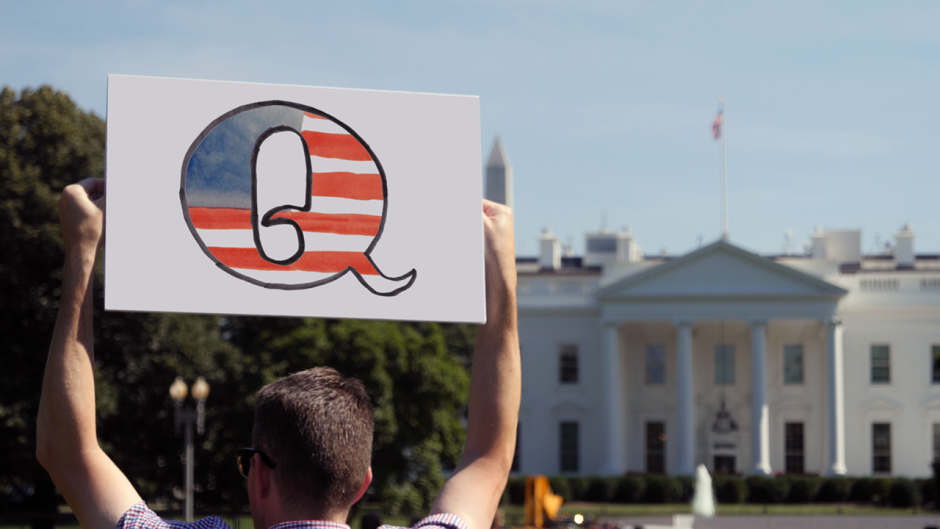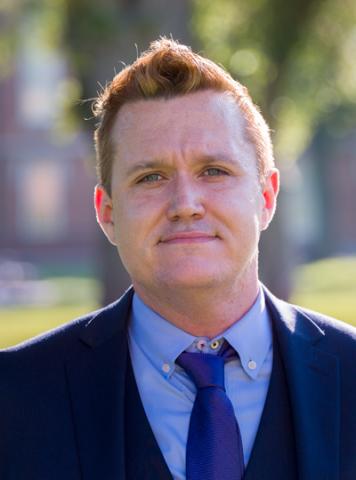
Aug. 9, 2022
Contact: Eric Stann, 573-882-3346, StannE@missouri.edu

Days before the events on January 6, 2021, at the U.S. Capitol, Chris Conner took a late-night phone call that would change the trajectory of his research at the University of Missouri.
“You need to go to the bank, get all of your cash out, then buy a gun and rations and have an evacuation plan to get out of wherever you might be,” the friend told Conner, a sociologist, adding that now former President Trump had taken siege of the Vatican, where the caller claimed a picture had been taken showing the power had been knocked out.
Conner, who likes to think he can keep a good poker face because of what he studies, responded: “That is the craziest thing I’ve ever heard. What are you talking about?”
The conversation eventually turned to the “10 days of darkness,” which Conner learned in QAnon lore is a period of time before what followers call ‘the storm’— the event during which QAnon followers expected Trump to roll out military personnel to take siege of the United States and the rest of the world, including the Vatican.
When the call ended, Conner immediately called another friend.
“Hey, have you heard about this?” he asked.
Ultimately, the experience sent Conner down a rabbit hole of information about what the 10 days of darkness were, and eventually to what QAnon is and why people follow it.
Since then, Conner has researched QAnon, including watching hundreds of hours of QAnon-related online content, to date.
“At some point, I just stopped counting the number of hours, to be honest,” he said.
Conner, an assistant teaching professor of sociology in the MU College of Arts and Science, soon recognized similarities between other subcultures he’s studied. These include listeners of electronic dance music and how social media has enabled greater interaction within the LGBTQ+ community, but at a cost of increased levels of social isolation and sexual racism.
“One of the major themes within QAnon is this lost community narrative, or where people feel something in their lives is missing, as if suddenly, something has changed and they are feeling disconnected from the rest of society,” he said. “What QAnon does for a lot of these people is it gives them a sense of purpose and belonging, and it connects them with a community of like-minded individuals. Incidentally, it’s also the same type of rationale used by people who join non-traditional religious institutions. QAnon is also using political disenfranchisement to create a weaponized subculture that’s also aimed toward a political purpose.”
‘A sense of normlessness’
Conner grew up in a small town in Indiana where his parents and grandparents were farmers. Consequently, he became attuned to research that shows how the living conditions in the rural United States, particularly the Rust Belt, have declined over the past 10-15 years. In many ways, Conner believes that is why QAnon has “weaponized” the people living in these areas.
“There’s a sense of normlessness,” he said. “They’re having real trouble trying to identify with a particular community, and they don’t understand why.”
Conner also notes the pandemic gave people more time to spend online and to find and spread information and disinformation in different ways. He said the main narrative of QAnon is actually an old antisemitic trope called “The Elders of the Protocols of Zion,” which was a Russian propaganda piece that disparaged Jewish people and painted them as demonic characters.
“On the surface, it doesn’t look like an antisemitic trope, but then when you start looking at the ideas presented in QAnon, it’s really just the retelling of an old story that was written in the early 1900s,” he said.
A lifelong passion
Ever since he can remember, Conner has wanted to be a sociologist.
“Sociology is what I like to call ‘applied philosophy,’” he said. “Philosophy gives us abstract ideas, but sociology says let’s apply those ideas and also gives real-world examples of what that looks like. For me, as a sociologist, our greatest gift is we are able to tell you why the world is the way it is. You may not like it, but our work contextualizes the current moment in time by showing the structural forces that work to shape history, and also how our choices shape history.”
This application came to life during his college studies. The experience of transcribing a woman’s story for a research project about women living with HIV in Indiana made him realize the benefits of doing work in public sociology.
“I heard this woman talk about how she was a lawyer, recently diagnosed with HIV, and her insurance dropped her as a result of her diagnosis,” he said. “She ended up with all of these medical bills and couldn’t afford to pay them, so she lost her job. Then, she reached out to public resources, but those weren’t meeting her needs and she started having issues with her health. It was at that moment where it became clear to me that sociology could show us this is why people are the way they are and how they got there.”
Conner said the experience of studying QAnon has raised some questions in his mind about how the movement surrounding the conspiracy theory is affecting the human experience.
“I think one of the things that this experience has exposed to me is that we, as Americans, really need to have a conversation about what kind of society we want to have,” he said. “What does that look like? What does our country look like? What is our future as citizens of the world? Do we want to be a country where people feel disenfranchised?”
Editor’s Note:
Conner’s work related to QAnon is published in Critical Sociology.



